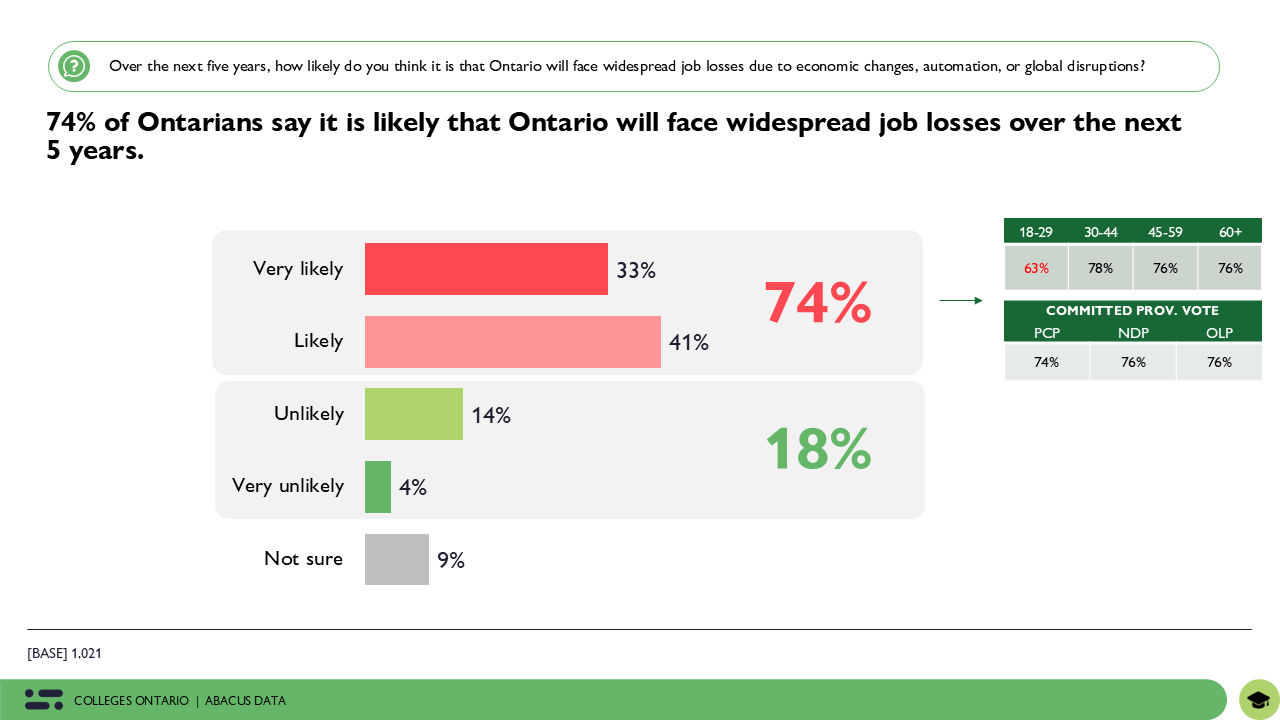Abacus Data Poll: Crime and Safety Rise as Top Issue as Parliament Resumes. Liberals and Conservatives tied.
September 21, 2025
From September 12 to 17, 2025, Abacus Data surveyed 2,230 Canadian adults on the state of federal politics. The poll was conducted just before the return of Parliament, providing a clear snapshot of voter sentiment at the end of a quiet but uneasy summer. While headline vote numbers remain stable, the issue environment is shifting, with public safety concerns rising, and some evidence older voters may be starting to drift away from the Liberal camp.
At the same time, overall views of Prime Minister Mark Carney and his government have held steady. But with affordability, the economy, and – to a lesser extent – Trump, dominating public attention, the political landscape remains competitive.
Direction of the Country: Still Static, Still Pessimistic
Public mood about the country’s trajectory remains broadly unchanged. Today, 35% of Canadians say the country is moving in the right direction, while 49% believe things are off on the wrong track. These numbers are nearly identical to our last wave, underlining a persistent feeling of mixed views on the country’s overall direction.
Views of the world (13%) and of the United States (15%) continue to be quite pessimistic.

Top Issues: Crime and Safety Climb, Cost of Living Still Dominates
Affordability remains the dominant public concern: 57% of Canadians identify the rising cost of living as one of their top three issues, down slightly from last wave but still by far the top issue to more people.
The most notable shift is the rise in concern about crime and public safety, now selected by 20% of Canadians, up meaningfully from 16% just two weeks ago. That makes it one of the fastest-rising issues in several weeks, and a clear signal that public anxiety about safety is becoming a national flashpoint.
Concern about crime and public safety is slightly higher among older Canadians, in Ontario and the Prairies, and among Conservative voters. In fact, those who voted Conservative in the last election are almost three times as likely to rate it as a top issue than those who voted Liberal (32% vs. 13%). We will have a more detailed look at public perceptions about crime and public safety out next week.
Concern about Donald Trump and his administration (34%) has declined slightly, continuing its downward drift after hitting the mid-40s earlier this year. 44% of those who voted Liberal rate Trump and his administration as a top issue compared with 21% of Conservative voters.
Other concerns have remained stable:
The economy (37%) and housing affordability (34%) continue to rank just behind affordability. There’s no partisan difference on these issues.
Immigration (28%) and healthcare (31%) round out the second tier, showing continued relevance. 37% of Conservatives and 20% of Liberal voters rate immigration as a top issue.
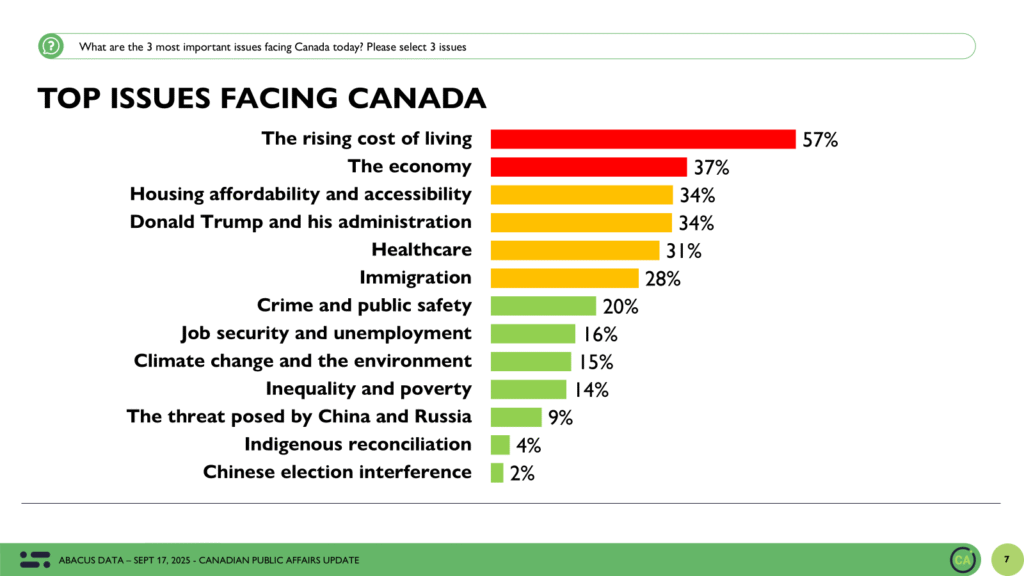
Government Approval: Holding Steady Amid Economic Jitters
Approval of the federal government led by Mark Carney stands at 50%, unchanged from our last wave. Disapproval also remains static at 30%, pointing to a continued level of support that, while lower than early summer, appears to have stabilized.
The plateau in approval may reflect competing pressures: while Canadians remain uneasy about the economy and affordability, many still see the government as competent and engaged on them leaving with considerable goodwill as the parliamentary session begins.

Leader Impressions: Carney Stable, Poilievre Competitive
Mark Carney’s personal numbers remain stable. This wave, 48% of Canadians say they have a positive impression of the Prime Minister, up 3 since last wave. Negative impressions are down 2 to 30%, giving Carney a net favourability of +18, slightly better than a two weeks ago.
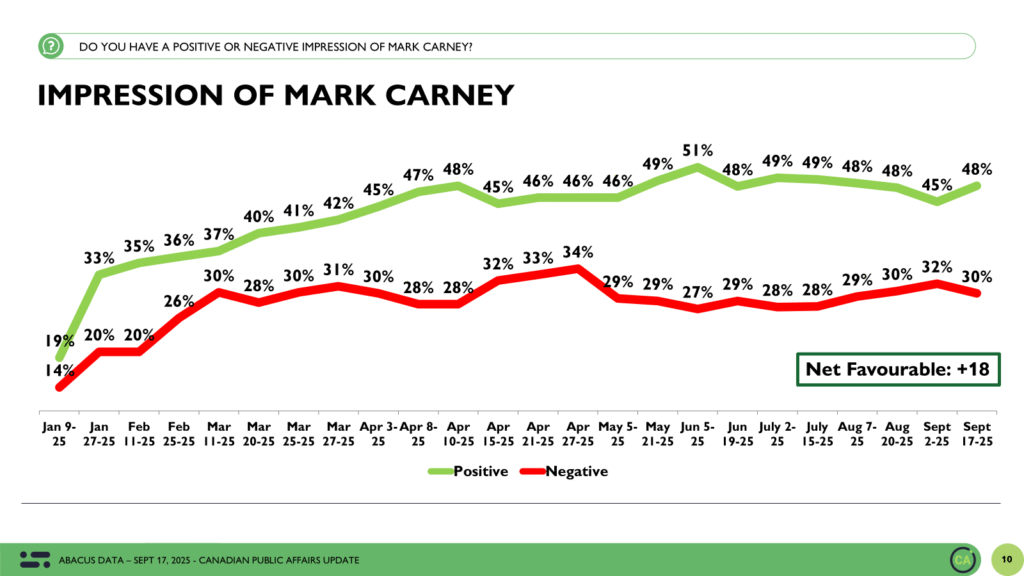
Pierre Poilievre’s ratings have also held steady. 40% view him positively, while 41% view him negatively, resulting in a net rating of -1, a slight improvement from -3 in the previous wave.
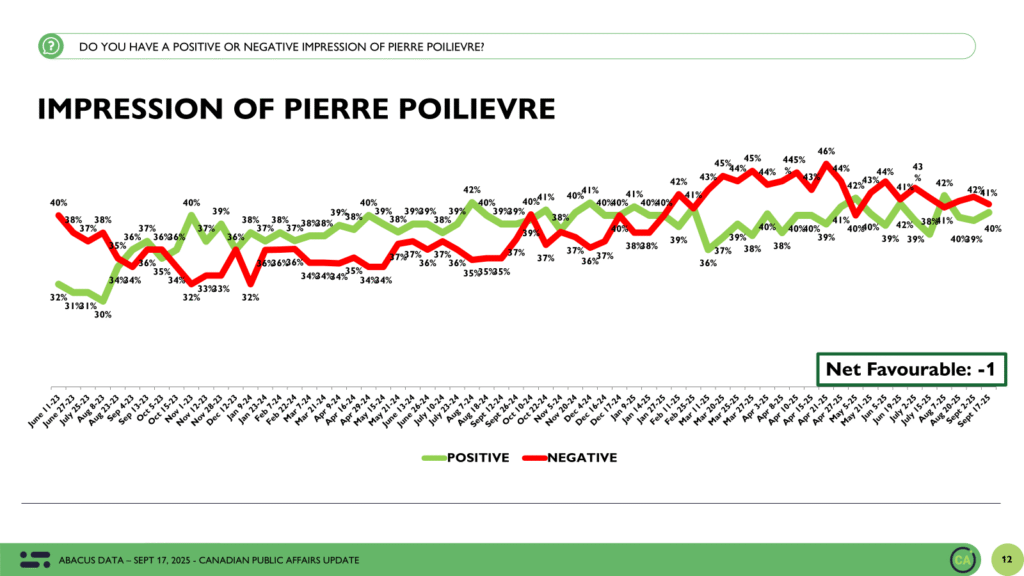
Issue Ownership: Liberals lead on the economy, health and Trump. Conservatives lead on immigration, crime, and the cost of living.
The Liberals have a 9-point advantage among those who rate healthcare as a top issue, a 3-point advantage among those who prioritize the economy, and a 37-point advantage among those who rank Trump in their top three issues.
Canadians continue to give the Conservative Party the edge on several other top issues, particularly those rising in public salience:
Crime and public safety: 66% say the Conservatives are best suited to handle the issue, compared to just 17% for the Liberals—a 39-point margin.
Immigration: The Conservatives lead by 43 points (60% to 17%) on an issue that remains a top-5 concern.
Cost of living: Conservatives maintain a 11-point lead (39% to 28%) over the Liberals among those most concerned with affordability.
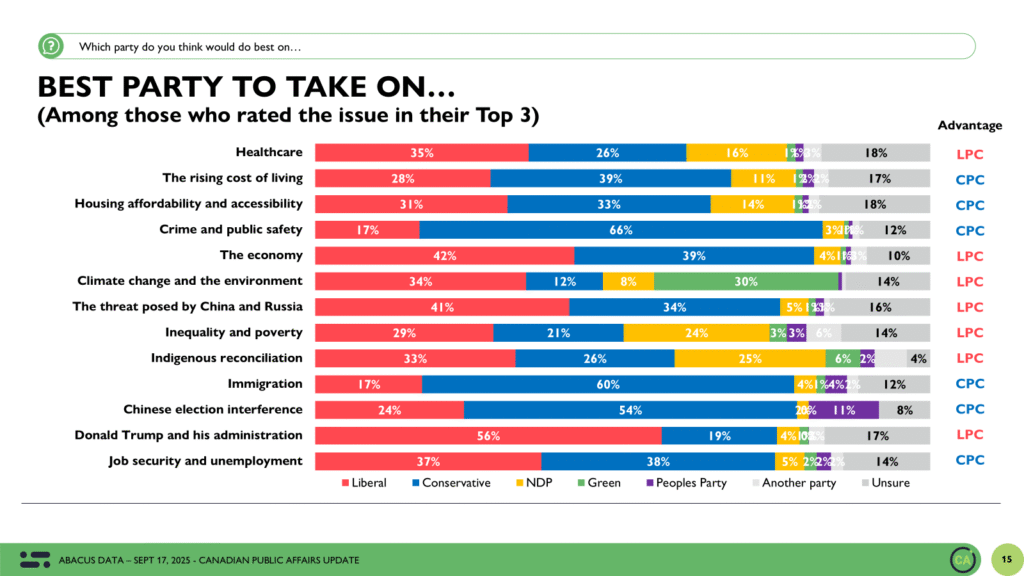
Accessible Voter Pools: Liberals and Conservatives in a Deadlock
The accessible pool for the Liberal Party is now 58%, up two points. The Conservatives are accessible to 56% of voters, also up slightly. The NDP remains stable at 37%. This suggests a persistently open political environment with both major parties competing for swing voters in a high-stakes fall season.

Vote Intention: Tie in the Topline
If an election were held today, we have the Liberals and Conservatives tied at 40% with the NDP at 8% and the BQ at 7%. The Liberals are down 3 since the last wave, the NDP up 2, and the Conservatives steady.
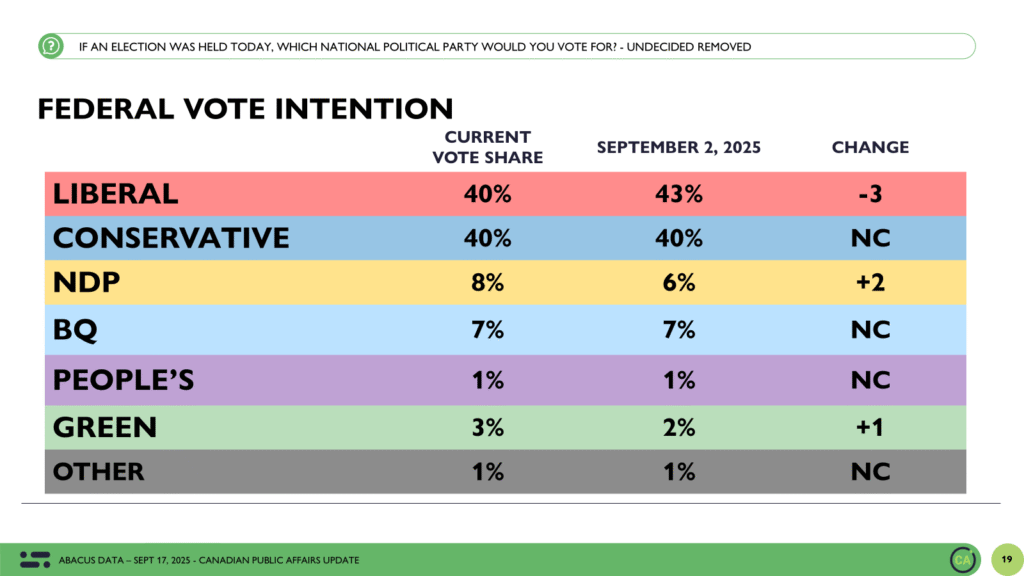

Regionally, we have the Conservatives slightly ahead in BC, and well ahead in the Prairies. The Liberals are slightly ahead in Ontario, lead by 7 in Quebec over the BQ, and are well ahead in Atlantic Canada.
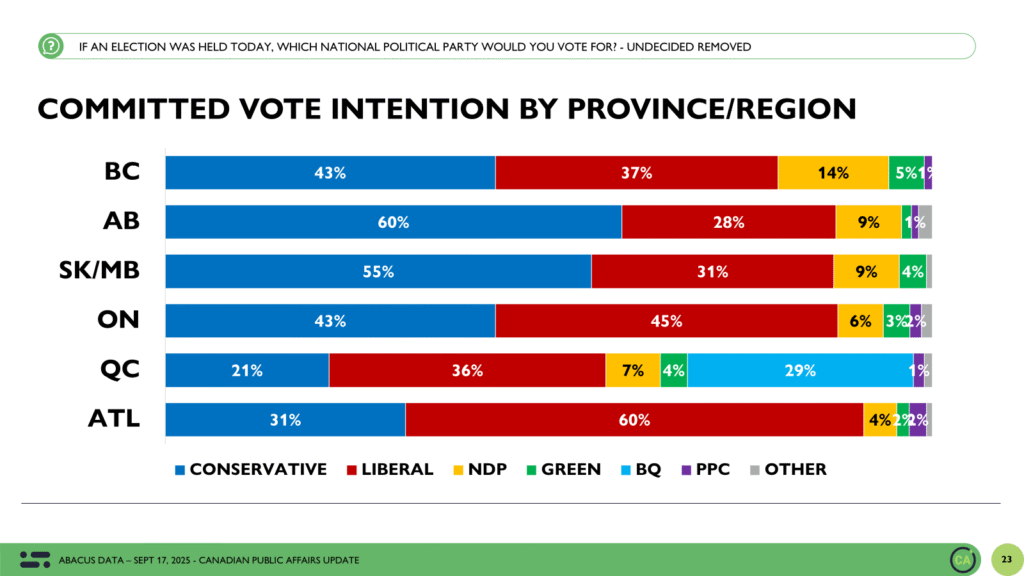
Demographic Trends: Seniors Shift Toward Conservatives
One of the most important shifts this wave is among Canadians aged 60 and over. Support for the Liberals among this group has dropped from 45% in early September to 42%, while Conservative support has risen from 38% to 40%, effectively eliminating what was a 7-point Liberal lead two weeks ago.
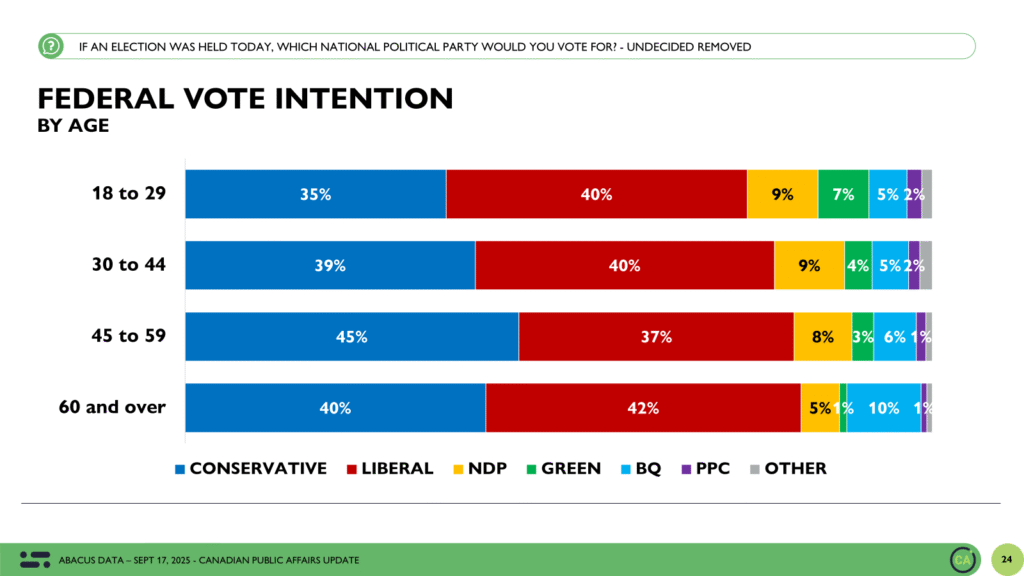
We find no gender gap in vote intentions but the education gap continues with those with a university degree more likely to vote Liberal than those with different types of education.
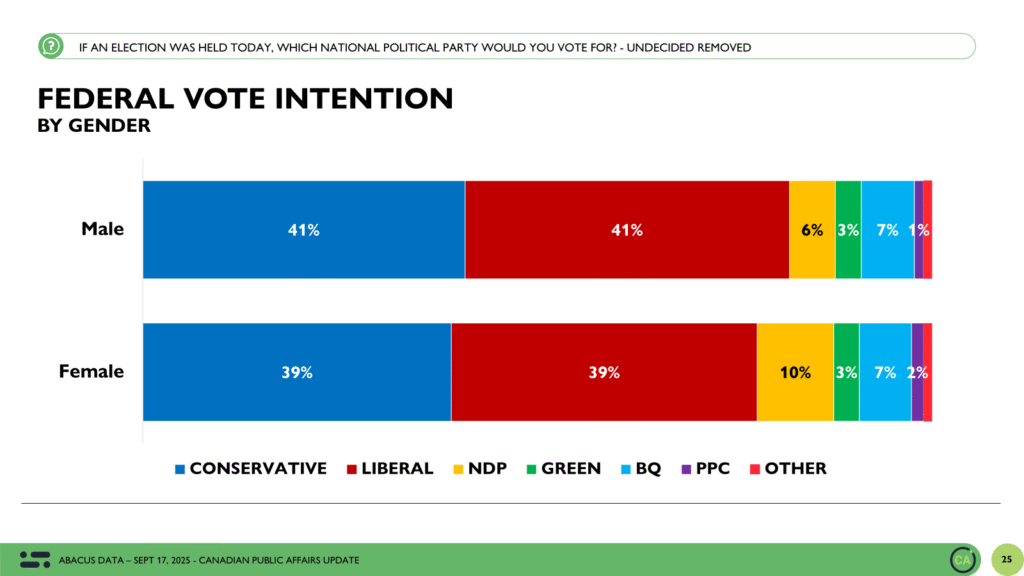
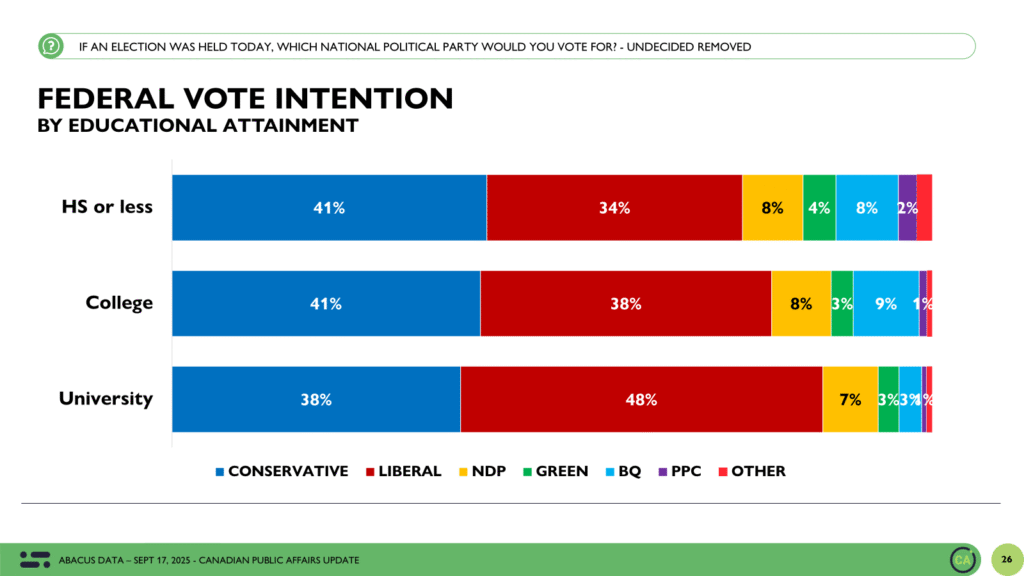
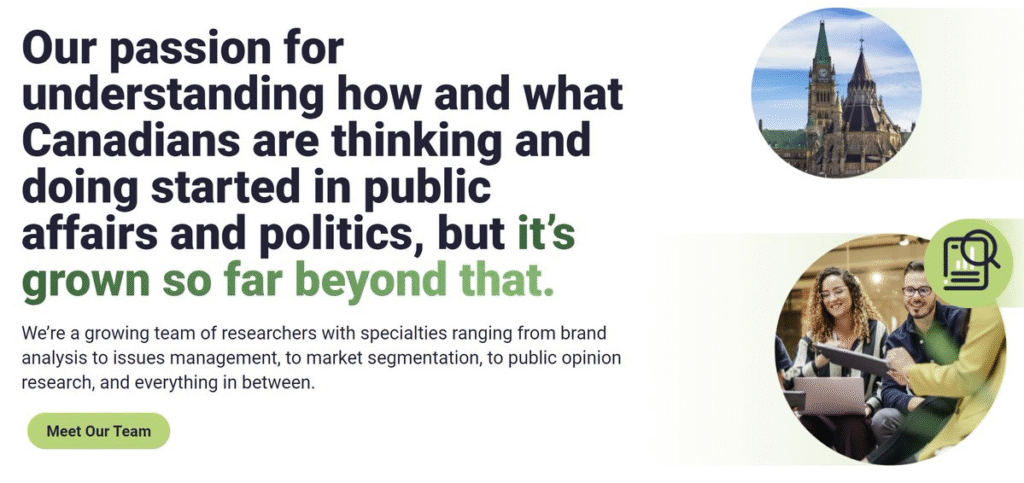
The Upshot
According to Abacus Data CEO David Coletto: “This wave of data reveals a political landscape that’s both competitive and unsettled. While headline numbers are steady, the underlying signals point to a rising sense of unease, particularly around affordability and now crime, which has increased in importance.
At the same time, immigration remains a top-tier concern and the economic environment continues to weigh on public confidence. The Carney government’s approval and favourability have stabilized after several waves of decline.
The drop in Liberal support among older Canadians is particularly notable, as it signals potential vulnerability among a group that was critical to the Liberal victory in the last election. We will continue to track this to see if it’s a new trend of just some noise in the data. With Parliament returning and economic pressures mounting, the fall sitting could prove to be a defining period for all parties.”
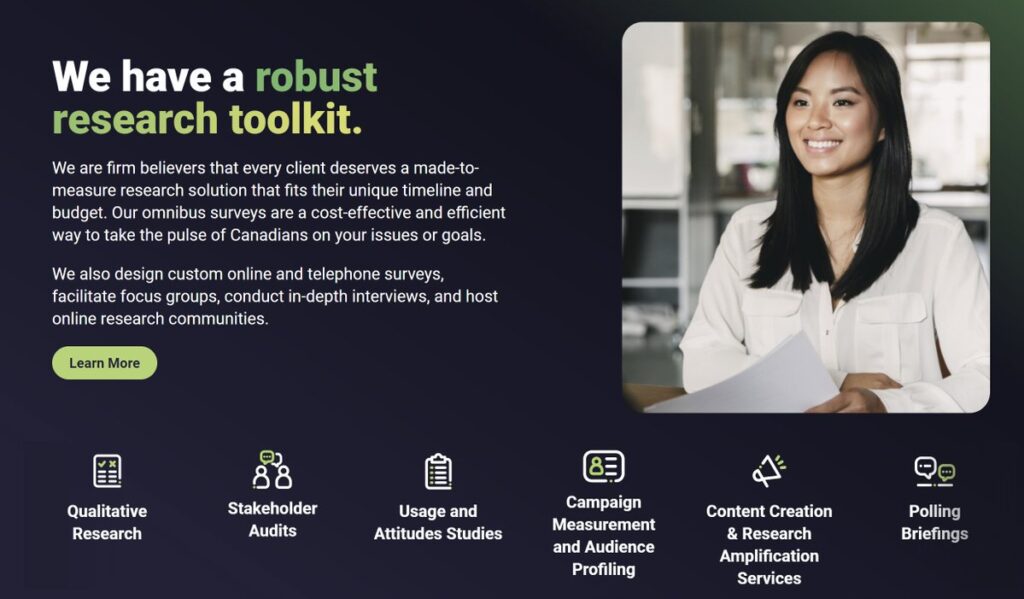
Methodology
The survey was conducted with 2,230 Canadians from September 12 to 17, 2025. A random sample of panelists were invited to complete the survey from a set of partner panels based on the Lucid exchange platform. These partners are typically double opt-in survey panels, blended to manage out potential skews in the data from a single source.
The margin of error for a comparable probability-based random sample of the same size is +/- 2.1%, 19 times out of 20.
The data were weighted according to census data to ensure that the sample matched Canada’s population according to age, gender, and region. Totals may not add up to 100 due to rounding.
Abacus Data follows the CRIC Public Opinion Research Standards and Disclosure Requirements that can be found here: https://canadianresearchinsightscouncil.ca/standards/
The survey was paid for by Abacus Data Inc.
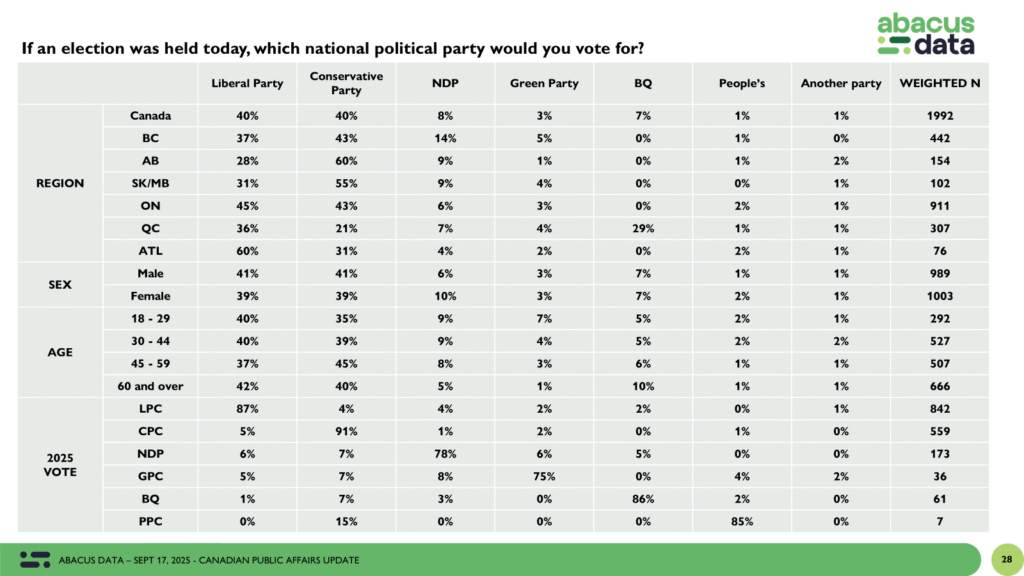
ABOUT ABACUS DATA
We are Canada’s most sought-after, influential, and impactful polling and market research firm. We are hired by many of North America’s most respected and influential brands and organizations.
We use the latest technology, sound science, and deep experience to generate top-flight research-based advice to our clients. We offer global research capacity with a strong focus on customer service, attention to detail, and exceptional value.
And we are growing throughout all parts of Canada and the United States and have capacity for new clients who want high quality research insights with enlightened hospitality.
Our record speaks for itself: we were one of the most accurate pollsters conducting research during the 2025 Canadian election following up on our outstanding record in the 2021, 2019, 2015, and 2011 federal elections.
Contact us with any questions.
Find out more about how we can help your organization by downloading our corporate profile and service offering.


